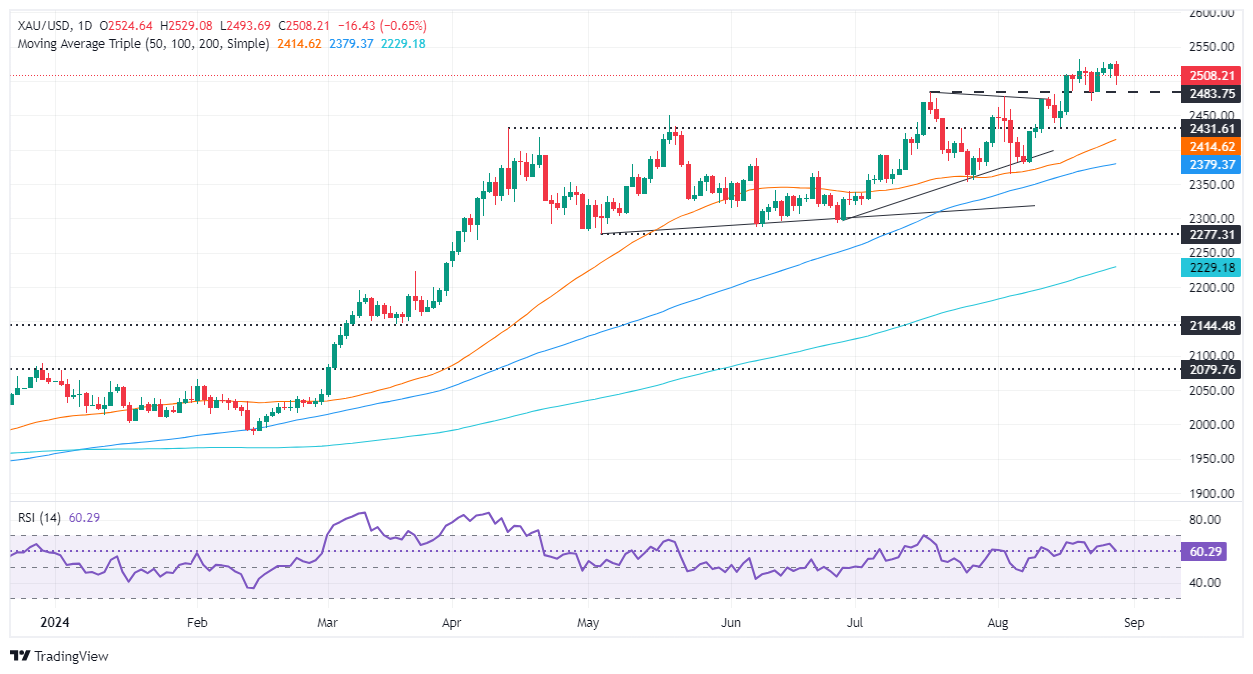Gold price dips as traders brace for US GDP data

- Gold drops 0.70% to $2,504 as US Dollar strengthens and Treasury yields rise following Powell’s dovish policy comments.
- DXY up 0.60% to 101.15, propelled by rising 10-year Treasury yield at 3.841%, challenging non-yielding assets like Gold.
- Market anticipates key US data: GDP estimates, Initial Jobless Claims and core PCE inflation gauge this week.
- Gold sees inflows and demand from China yet contends with a stronger US Dollar and rising yields.
Gold prices dropped more than 0.70% on Wednesday as the Greenback staged a comeback after Federal Reserve (Fed) Chair Jerome Powell hinted that the US central bank is ready to ease policy, because policymakers are worried about a weak labor market. The XAU/USD trades at $2,504 after retreating from a daily peak of $2,529.
Wall Street trades with losses ahead of Nvidia’s fiscal Q2 2025 earnings report. The US Dollar hits a three-day high underpinned by heightened US Treasury bond yields, with the US Dollar Index (DXY) sitting at 101.15, gaining 0.60%.
Despite that, the golden metal hovers above $2,500 even though the US 10-year Treasury note yield rises two basis points to 3.841%, a headwind for the non-yielding metal.
Sources cited by Reuters noted, “We’re seeing a little pressure coming from a bit firmer dollar. And at this point, we’re waiting for further information to drive this market either one direction or the other based on that inflationary data.”
Meanwhile, bullion prices are expected to rise further in the aftermath of Powell’s speech at Jackson Hole, in which he said the time has come to begin lowering borrowing costs amid increased confidence that inflation is headed toward the Fed’s 2% goal.
He added that the risks of the dual mandate are skewed toward the downside of inflation and the upside of employment. The sudden shift suggests that upcoming jobs market data will be crucial to assess the pace and size of the upcoming interest rate cuts.
According to the World Gold Council, XAU/USD prices also benefitted from a modest increase in net inflows of 8 metric tons ($403 million) last week, led by North American funds. Moreover, China’s net Gold imports rose by 17% in July, marking the first month of increases since March, data showed on Tuesday.
The US economic docket is scarce on Wednesday, but Thursday and Friday will be busy. On Thursday, the second estimate of Gross Domestic Product (GDP) is expected to show the economy continues to grow above trend. At the same time, the US Department of Labor will release Initial Jobless Claims for the week ending August 24.
On Friday, the Fed’s preferred inflation gauge, the core Personal Consumption Expenditures Price Index (PCE) is expected to tick a tenth higher, according to the consensus.
The December 2024 Chicago Board of Trade (CBOT) fed funds future rates contract hints that investors are eyeing 100 basis points of Fed easing this year, up from Monday’s 97. This implies that traders estimate a 50 bps interest rate cut at September’s meeting, though odds for lowering rates of that size lie at 36.5%, according to the CME FedWatch Tool.
Daily digest market movers: Gold price retreats as traders brace for US data
- If US economic data continues to be weak, the Gold price uptrend is likely to persist, fueling speculation about a larger rate cut by the Fed.
- Gross Domestic Product (GDP) figures for Q2 in the second estimate are expected to improve from 1.4% to 2.8%.
- Initial Jobless Claims for the week ending August 24 are expected to remain unchanged at 232K compared to the previous reading. Weakness in the labor market could increase the chances of a bigger rate cut by the Fed.
- The core Personal Consumption Expenditures (PCE) Price Index is expected to rise from 2.6% to 2.7% YoY.
- Next week, the US economic docket will feature the August Nonfarm Payrolls report, which could be crucial to assess the size of the Fed’s first rate cut at the September meeting.
Technical outlook: Gold’s uptrend is intact despite posting losses, aiming toward $2,500
Gold’s uptrend remains intact, even though the yellow metal hit a daily low beneath the $2,500 figure at $2,493. The Relative Strength Index (RSI) shows bullish momentum has faded, yet buyers are looming amid the ongoing pullback.
If XAU/USD drops below $2,500, the first support would be the July 17 peak at $2,483. If surpassed, the $2,450 psychological mark would emerge as the next support, followed by the 50-day Simple Moving Average (SMA) at $2,414.
Conversely, if bullion prices stick above $2,500, the next resistance would be the all-time high at $2,531. On further strength, Gold could test $2,550 before challenging $2,600.
Economic Indicator
Gross Domestic Product Annualized
The real Gross Domestic Product (GDP) Annualized, released quarterly by the US Bureau of Economic Analysis, measures the value of the final goods and services produced in the United States in a given period of time. Changes in GDP are the most popular indicator of the nation’s overall economic health. The data is expressed at an annualized rate, which means that the rate has been adjusted to reflect the amount GDP would have changed over a year’s time, had it continued to grow at that specific rate. Generally speaking, a high reading is seen as bullish for the US Dollar (USD), while a low reading is seen as bearish.
